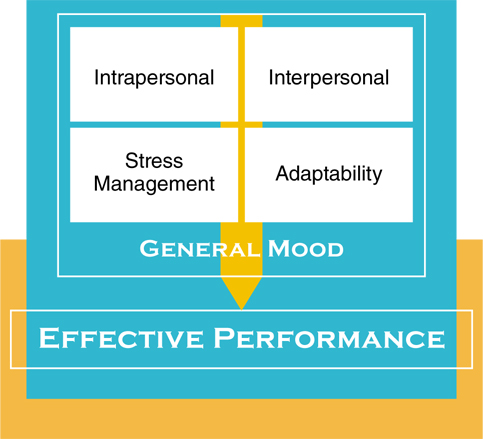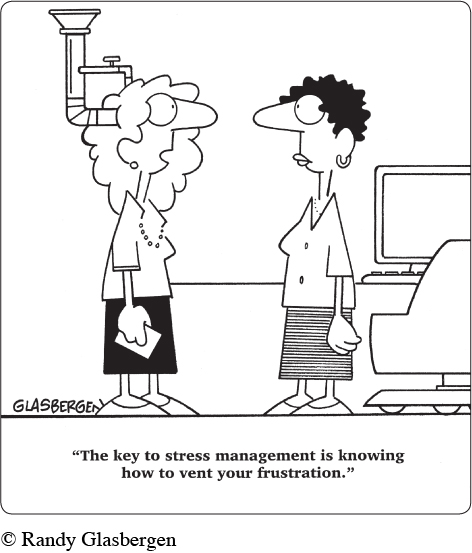Identifying Competencies: Looking at the Research
Emotional intelligence includes many capabilities and skills that influence a person’s ability to cope with life’s pressures and demands. Reuven Bar-On, a professor at the University of Texas at Austin and a world-renowned EI expert, developed a model that demonstrates how categories of emotional intelligence directly affect general mood and lead to effective performance (see Figure 3.1).

FIGURE 3.1  Bar-On Model of Emotional Intelligence
Bar-On Model of Emotional Intelligence
Let’s look more closely at the fifteen specific skills and competencies that Bar-On has identified as the pieces that make up a person’s emotional intelligence.1 They are similar to the pieces of a jigsaw puzzle—once you’ve put them all together, you will begin to see yourself and others more clearly.
Intrapersonal Skills This first category relates to both how well you know and like yourself, and how effectively you can do the things you need to do to stay happy. Understanding yourself and why you think and act as you do is the glue that holds all of the EI competencies together. This category is made up of five specific competencies:
- Emotional self-awareness. Knowing how and why you feel the way you do.
- Assertiveness. Standing up for yourself when necessary without being too aggressive.
- Independence. Making important decisions on your own without having to get everyone’s opinion.
- Self-regard. Liking yourself in spite of your flaws (and we all have them).
- Self-actualization. Being satisfied and comfortable with your achievements.
Interpersonal Skills Recent studies have shown that people with extensive support networks are generally happier and tend to enjoy longer, healthier lives. Your ability to build relationships and get along with other people depends on the competencies that form the basis for the interpersonal skills category:
- Empathy. Making an effort to understand another person’s situation or point of view.
- Social responsibility. Establishing a personal link with a group or community and cooperating with its other members in working toward shared goals.
- Interpersonal relationships. Seeking out and maintaining healthy and mutually beneficial relationships, such as friendships, professional networks, family connections, mentoring relationships, and romantic partnerships.
Adaptability Things change. Adaptability—the ability to adjust your thinking and behavior when faced with new or unexpected situations—helps you cope and ensures that you’ll do well in life, no matter what the challenges. This category includes three key competencies:
- Reality testing. Ensuring that your feelings are appropriate by checking them against external, objective criteria.
- Flexibility. Adapting and adjusting your emotions, viewpoints, and actions as situations change.
- Problem solving. Approaching challenges step by step and not giving up in the face of obstacles.
high-impact practice 3
Work Together
Observing Emotional Intelligence
Working with one or two other students, agree to watch at least one TV show during the coming week—a situation comedy, drama, or even a cable news program. Each group member can watch the same show or a different show. Take brief notes on how the fictional or nonfictional characters handle their emotions, especially in stressful situations. How many of the fifteen EI competencies were represented—either positively or negatively—in the shows you watched? During next week’s class, discuss what you saw and what you learned.
Stress Management In college, at work, and at home, now and in the future, you’ll face what can seem like never-ending pressures and demands. Managing the resulting stress depends on two skills:
- Stress tolerance. Recognizing the causes of stress and responding in appropriate ways, so you can stay strong under pressure.
- Impulse control. Thinking carefully about potential consequences before you act, and delaying gratification for the sake of achieving long-term goals.

Overall Mood It might sound sappy, but having a positive attitude really does improve your chances of doing well. Bar-On emphasizes the importance of two emotions in particular:
- Optimism. Looking on the bright side of any problem or difficulty and being confident that things will work out for the best.
- Happiness. Being satisfied with yourself, with others, and with your situation in general. It makes sense: If you feel good about yourself and manage your emotions, you can expect to get along with others and enjoy a happy, successful life.
Knowledge of self is strongly connected to respect for others and their way of life. If you don’t understand yourself and why you do the things you do, it can be difficult for you to understand others. What’s more, if you don’t like yourself, you can hardly expect others to like you.
Make Good Choices
Act Instead of React
Your emotional reactions, whether positive or negative, affect your interactions with other people. Pretend that you are your own therapist. In what kinds of situations have you had “knee-jerk” reactions when you’ve reacted with defensiveness, anger, sadness, annoyance, resentment, or humiliation? Take a step back and “process” these reactions. Think about what you said or did in response to your feelings, and why. Then talk with a trusted friend or classmate about how you reacted and whether you could have chosen to act differently. What can you do to take control and make good choices the next time you are faced with a potentially volatile situation?